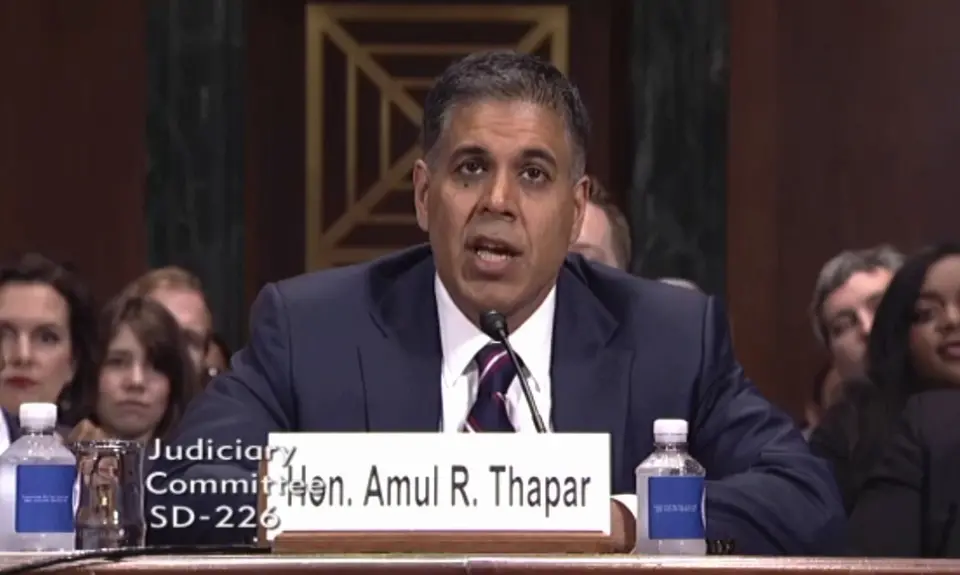“Confirmed Judges, Confirmed Fears” is a blog series documenting the harmful impact of President Trump’s judges on Americans’ rights and liberties. Cases in the series can be found by issue and by judge at this link
Trump Sixth Circuit judge Amul Thapar wrote a 2-1 opinion that granted an emergency preliminary injunction against a part of a federal COVID relief bill that prioritized assistance for 21 days to businesses owned by female, minority, and socially disadvantaged persons, and strongly indicated that the provision will be found unconstitutional. The May 2021 decision was in Vitolo v Guzman.
An important part of the American Rescue Plan proposed by President Biden and passed by Congress to help deal with the economic effects of COVID-19 was the Restaurant Relief Fund (RRF). This provided almost $30 billion to help small restaurant owners meet payroll and other expenses to help compensate for COVID-related devastation. Based on evidence submitted to Congress of the particular COVID-related harm suffered by minorities, women, and socially disadvantaged people who own such businesses, the law provided that they (along with veterans) would get priority in processing grant applications during the first 21 days that the program was in operation.
The Wisconsin Institute for Law and Liberty (WILL), which had previously filed lawsuits seeking to purge registered Wisconsin voters and to stop a COVID-related face mask mandate, filed a lawsuit in Tennessee to challenge the 21-day priority on behalf of a white restaurant owner, Antonio Vitolo. The district court rejected the suit and denied requests for preliminary relief. The court explained that Congress had “myriad evidence” that businesses owned by minorities and women “have suffered more severely” than others “during the COVID-19 pandemic” and that earlier, more general COVID-19 relief programs (under the Trump Administration) had “disproportionately failed to help those businesses directly,” partly because of “historical discrimination patterns.”
WILL appealed and filed an emergency motion for a preliminary injunction pending appeal. Using a procedure similar to the Supreme Court’s disfavored “shadow docket,” Trump judge Thapar wrote a 2-1 decision granting the motion. Even though the 21-day period had expired, Thapar claimed that relief was still necessary because the preferences remain “in place” and the funds may “run out” unless Vitolo’s application is processed quickly. Thapar did not discuss the evidence relied on by the district court and Congress. Instead, he claimed that the government was arguing that the program was justified by past “societal discrimination” against women and minorities and ruled, based on cases that had struck down broader and more long-lasting affirmative action preference programs, that the RRF 21-day program was unconstitutional and that the plaintiffs “will win” on the merits of their claims. At one point, he called the program “racial gerrymandering.” He ordered that the government must fund Vitolo’s application “before all later-filed applications” by women or minorities, and expedited the appeal.
Although she did not disagree about expediting the appeal, Judge Bernice Donald strongly dissented from Thapar’s opinion. She began by objecting to the use of the court’s emergency docket to produce “abrupt and sweeping” results because WILL had not met its burden of showing “irreparable harm.” Specifically, although WILL had initially claimed emergency relief was needed or all the RRF funds would be “fully depleted,” they failed to prove that assertion. Evidence from the government showed that “only 20%” had been allocated; and in response to an unusual request from the appellate panel, the government provided later “sworn testimony” that RRF funds are still not depleted and that they had “set aside the full amount of money” that Vitolo requested. These facts and the expiration of the 21-day period suggest that the controversy may now be moot, she noted, and Thapar’s concern that funds might run out is not sufficient to show irreparable harm. The court should establish “clear procedures for emergency matters,” Donald urged, so it does not “address constitutional questions of profound importance on a moment’s notice without development of the record” as in this case.
Judge Donald also showed that Thapar was wrong on the merits of those constitutional questions. As demonstrated by the evidence and district court findings that Thapar disregarded, she explained, the 21-day priority period is a “short-term, narrowly tailored, carefully calibrated measure designed to assist businesses most devastated by the pandemic.” She noted that it was not a “long-term change in public policy” to try to compensate for broader societal discrimination as in past cases where the courts have sometimes struck down such programs, but instead a “monetary lifeline aimed at ameliorating short-term economic devastation.” There was thus a “strong basis in evidence” to support the narrow program, which was very different than programs in the cases relied on by Thapar, who “mischaracterizes” the specific and narrow basis for the program as argued by the government. In short, she concluded, WILL is “unlikely to succeed on the merits of their appeal” and their request for emergency injunctive relief should have been denied.
Although the longer-term consequences of Trump judge Thapar’s decision remain unclear, the case is another example of action by Trump judges to interfere with and stop efforts by Congress and the Biden Administration to help Americans. It is crucial to our fight for our courts that more jurists nominated by President Biden be promptly confirmed, including with respect to the Sixth Circuit, to counterbalance the harmful effects of Trump judges. Judge Donald herself has announced she will be taking senior status upon the confirmation of her successor.
